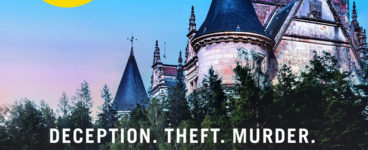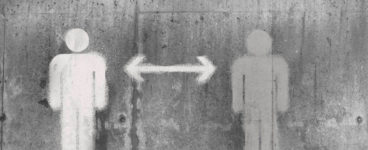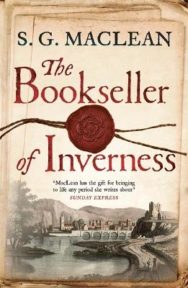‘I had long resisted the idea of a novel on the Jacobites. Born in Inverness and brought up in the Highlands, I can’t recall a time when I didn’t know the story of Culloden and its aftermath.’
Set in the wake of the 1746 battle of Culloden, Iain MacGillivray was left for dead – years later, he lives a quiet lift as a bookseller in Inverness. But that quiet can only last for so long, with a body being found dead by his shop. Author S.G. MacLean tells Books from Scotland a bit more about what drew her to this story.
The Bookseller of Inverness
By S.G. MacLean
Published by Quercus Books
The Bookseller of Inverness, a story of revenge and murder set in the Highlands in 1752, was a long time coming. The seeds of the idea for the novel were planted in my head over ten years ago, in the then coffee-shop in the gallery of Leakey’s, the vast second-hand book shop in the oldest part of Inverness. As I sat with my coffee and scone, surrounded by thousands of old books and warmed by the huge log-burning stove downstairs, I learned that this was the site of the old Gaelic church where, in the aftermath of the Culloden, Jacobite prisoners had been held in atrocious conditions. Many were put onto prison ships to be taken to England for trial and execution, or transported to indentured servitude in North America or the Caribbean. Others were taken out into the graveyard of the nearby High Kirk, and shot. Leakey’s, it is said, is haunted by their ghosts.
From that moment, it was impossible to disconnect the place in my mind from what had happened there. Soon afterwards, I wrote a short story exploring the idea of the bookshop and some past bookseller being inextricably linked to some sinister event connected to the last Jacobite rising. Nothing came of it.
In the Spring of 2020, I had just finished the 5th in my Damian Seeker series. The books had taken me to London, Oxford, York and Bruges, all places I had had very little knowledge of beforehand. Inhabiting them in my imagination had taken a lot of work and with each book, I felt I was getting further and further geographically and culturally from my own world. I had come to a point of wanting to write about my own place, my own history. Intermittently, I had been working on a non-crime, nineteenth-century novel based around the Black Isle, very close to where I live. Come the summer of 2020 however, conversations with my editor and others suggested that such an uncertain time was really not the right one to make such a significant shift of period or genre. My editor probed – what else did I have? What about the Jacobites? And so, tentatively, I told her about my bookseller. Very soon afterwards, my synopsis was drawn up and the book commissioned.
I had long resisted the idea of a novel on the Jacobites. Born in Inverness and brought up in the Highlands, I can’t recall a time when I didn’t know the story of Culloden and its aftermath. I’d first visited the battlefield with my father, a native Gaelic speaker who’d been born nearby. Anyone who has visited the place will know the atmosphere that envelops it to somehow cut away the intervening centuries. Anyone with an eye to the news will know that planning around it or the naming of places related to the ’45 rising remain live issues. The school of which my husband is headteacher faces directly across to the house in which Charles Edward Stuart spent the night before the battle, and the Duke of Cumberland the night after. Culloden, and its aftermath are very much part of the Highland consciousness, and for me, to embark on a novel around them was to go where angels fear to tread.
But I did embark upon it, and in the circumstances of travel and access limitations I was able to tread in my walking books or pedal on my bike to almost every place I wanted to write about. As I did so, I found myself inevitably drawn to places where my father had grown up or had first taken me to – the areas around Daviot and Dunlichity in Strathnairn, Clava Cairns and of course, Culloden itself. My main character – Iain MacGillivray – is a bookseller trying to find some way forward in his life after the devastation wrought in it by the ’45 Jacobite rising in which he had taken part. As I wrote the book, I could not shake off the consciousness of my father’s generation of native Highlanders whose lives had been blighted by having to go through a war of their own.
I returned again and again to Leakey’s for rare and out-of-print sources fundamental to my story. When the Highland Archive at Inverness re-opened, I was first through the door. The eighteenth-century manuscript records of the town gave a sense of immediacy and life to the people I was reading about. The Highlanders of the past, the ghosts of Culloden, had been real, flesh and blood characters with cares and intrigues and sorrows and laughter of their own. They came to life in my mind, and, fictionalised in the pages of my book, took their place for me once again in the town where they, and I, had been born.
The Bookseller of Inverness by S.G. MacLean is published by Quercus Books, priced £16.99.
ALSO IN THIS ISSUE

 The Book…According to Denise Mina
The Book…According to Denise Mina
‘The truth is that structure deserves to be broken and readers are delighted and refreshed when it h …

 The Social Distance Between Us
The Social Distance Between Us
‘The question I least enjoy answering is also the one I am asked most frequently: ‘Where did you lea …













